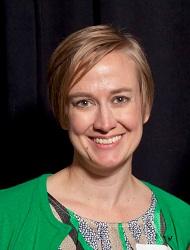MU researcher highlights the value of self-determination for young adults with autism

Credit: MU News Bureau
COLUMBIA, Mo. – The independence that comes with growing up can be scary for any teenager, but for young adults with autism spectrum disorder and their caregivers, the transition from adolescence to adulthood can seem particularly daunting. Tasks such as managing one’s own health insurance or applying for a car loan can be especially challenging for individuals with developmental disabilities.
Now, researchers at the University of Missouri are working on improving independence for people with autism by setting personalized goals early in adolescence and providing opportunities to achieve those goals. In the new study, Nancy Cheak-Zamora, associate professor in the MU Department of Health Sciences, School of Health Professions, and researcher at the Thompson Center for Autism and Neurodevelopmental Disorders, measured the self-determination of young adults with autism to better assist their transition to adulthood.
“We found that there was a disconnect between the support the caregivers are providing and what the young adults are doing themselves to become more independent,” Cheak-Zamora said. “We need to allow adolescents, particularly those with disabilities, to take on greater responsibilities at an earlier age and raise their expectations by first asking them about their goals and then providing the resources and support systems to help them achieve those goals.”
Cheak-Zamora partnered with five autism clinics across the country to survey more than 500 caregivers of young adults with autism between the ages of 16 and 25. She worked with undergraduate and graduate students to analyze the results and found that many young adults with autism are struggling to achieve independence.
Cheak-Zamora explained that increasing self-determination for young adults with autism starts with shifting the perception about what individuals with developmental disabilities can achieve.
“As a society it would be helpful to move away from a focus on deficits and challenges that people with autism and other disabilities face to considering their strengths and skill set. We can then develop ways to help each person build on their strengths,” Cheak-Zamora said. “For example, many with autism are incredibly detail-oriented. So, let’s think about job opportunities that require very detailed work so they can use that skill as an asset to succeed in employment. Not only will the individual benefit, but society as a whole will as well.”
Cheak-Zamora recommends that parents and caregivers provide all adolescents, including those with developmental disabilities, with opportunities to experience mastering a task, such as cooking, shopping, managing money or driving.
###
The study, “Self-determination in young adults with autism spectrum disorder,” was published in Autism. Funding was provided by the United States Department of Defense IDEA Development Award. The content is solely the responsibility of the authors and does not necessarily represent the official views of the funding agency.
Media Contact
Brian Consiglio
[email protected]
573-882-9144
Original Source
https:/
Related Journal Article
http://dx.




